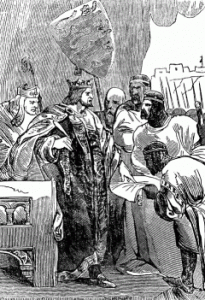In 1200, King John became involved in a long-drawn out war with France. This war was expensive and John was forced to introduce new taxes to pay for his army. This created a great deal of resentment in England, and John’s position was not helped when, in 1205, the king’s army lost control of Normandy, Brittany, Anjou and Maine.
Today we face a referendum on our continued participation in the EU.
In 1215, King John made another desperate attempt to gain control of his lost territory in France. Once again he was defeated and was forced to pay £40,000 to obtain a truce. When John tried to obtain this money by imposing yet another tax, the barons rebelled.
Today we complain about a North South divide in the way that our taxes are spent.
The king was obliged to sign a Magna Carta. In this charter the king made a long list of promises, including no new taxes without the support of his barons, a reduction in the power of his sheriffs and the right of a fair trial for all freemen.
Today everyone enjoys the right to a fair trial (other, possibly , than bankers, politicians and failed football club managers).
It was King John himself who gave York the chance of self-government. The disastrous and expensive military campaigns left him sorely in need of funds, and one way to raise them was to allow a town’s citizens to buy the right to rule themselves. York’s charter came in 1212, when King John allowed York’s citizens, rather than the Sheriff, to collect and pay the annual tax to the Crown, to hold their own courts and to appoint a mayor.
From then on, until local government reorganisation in 1974, York was a self-governing city under its own mayors.
In 1996 it threw off he yoke of Northallerton and once again became a prosperous and independent City.

